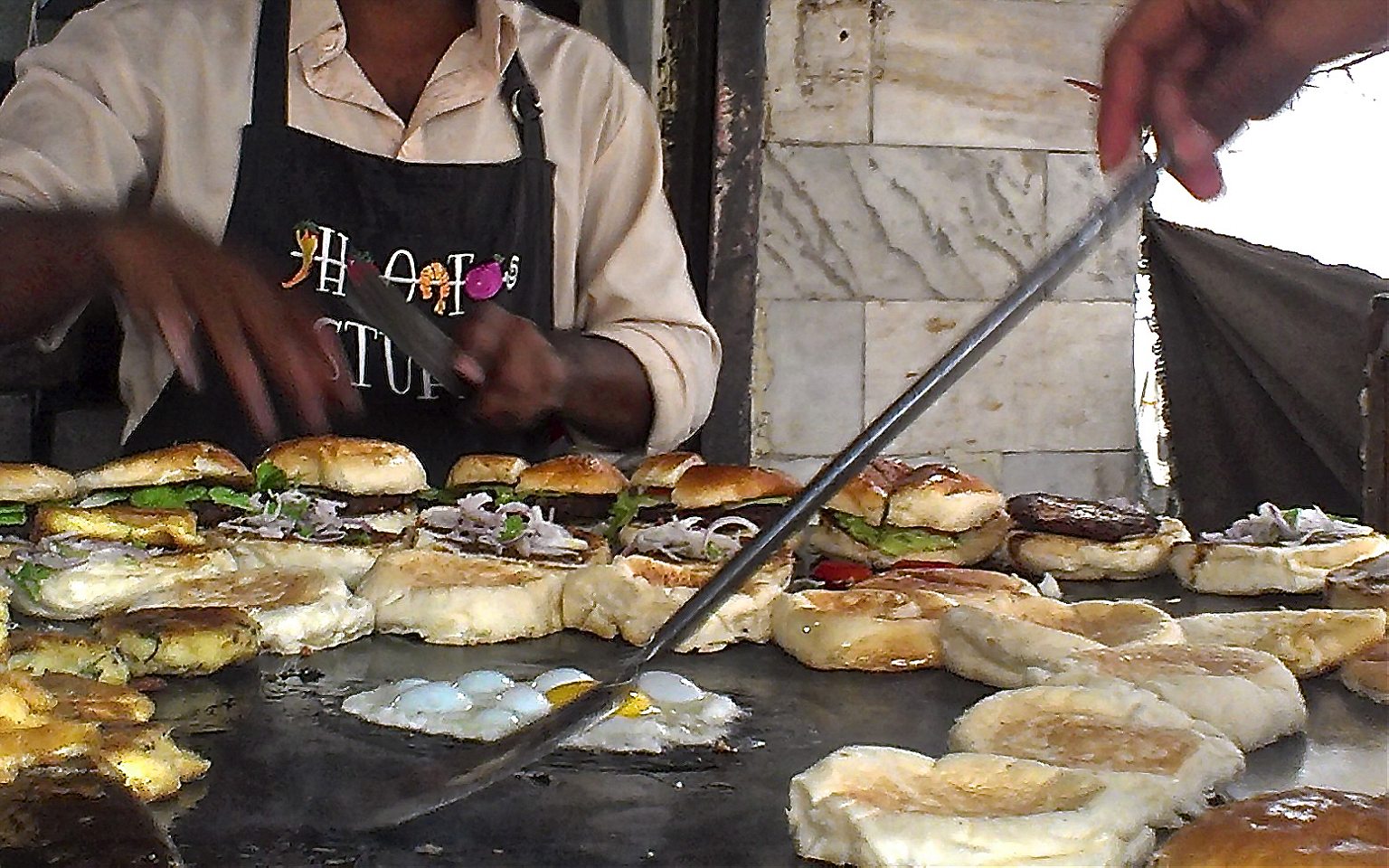The burger may have a foothold in Pakistan, but on the streets of Karachi, the beloved bun kebab reigns supreme.
When McDonald’s and KFC first opened up in Pakistan in the 1990s, there were manic scenes. Snaking queues, traffic jams for miles and kids running amok in play areas. Burger joints had existed before, but the fried chicken and ‘would you like fries with that’ phenomena swept through the country, paving the way for spinoffs in every neighbourhood and small town.
But long before the golden arches began gleaming through Pakistan, there was always the poor man’s burger: the bun kebab.
The bun kebab builds on the familiar burger formula: it’s a patty in a bun. But its flavors stretch far beyond the western world, combining Pakistanis’ love for spices and fried food, all in one go.
While there are many ways to fill a bun kebab, two patties emerge as the overwhelming favorites on the streets of Karachi: the shami kebab, made from minced meat, egg, chillies and spices such as ground cumin and cinnamon, and a lentil or boiled potato patty, which is soaked in an egg batter before being shallow fried in butter. The condiments are what make it so quintessentially Pakistani: a heap of sliced onions, spicy tamarind chutney, cucumber and tomato slices and a secondary patty just made of beaten egg. It’s served up at roadside cafes or at stalls where people crowd around and wolf them down in minutes, chased with bottles of warm soft drinks. The price? A fraction of what an ‘imported’ burger costs: between 30 cents to half a dollar, compared to a basic McDonald’s cheeseburger ($1.20).
Classic Burger is run by a family who now operates forty bun kebab joints in just one area of Karachi, and have rented out stalls all over the city. Pervaiz Jalal has worked at one for fifteen years. “My maternal uncle Chaudhry Ameer Mohammad came to Karachi from Kashmir forty years ago and set up a cart on Tariq Road. Now our entire family is in the business.”
Every day, the branch Jalal runs sells 250 to 300 bun kebabs, though his take is slightly modernized: it arrives with a side of fries and the bun kebab features ‘colesalad’ and ketchup. The fries, Jalal says, were incorporated based on customer demand. Despite the western touches, Jalal’s best seller remains the lentil and egg patty. “It’s the most delicious one,” he says.
At Nursery Super Bun Kebab, a worker explains between flipping buns that this is because most people don’t trust eating meat from a roadside stall. Nursery Super Bun Kebab – whose specialty is crispy, spiced mincemeat kebabs – also adds sliced beetroot. A bun kebab is good, Jalal says, because of its condiments: the chutney and the vegetables make the dish.

Watching a bun kebab being prepared is a hypnotic experience. A cook slices the bun and browns it on a griddle with clarified butter. He fries the patty at the same time, pressing it down with a spatula to absorb the fat and crisp it up against the hot surface. He then combines the two, followed by a cascade of condiments, before returning the whole package to the griddle for a final crisping. Eating it isn’t any less of an experience: the warm bun, the juicy patty and the tart chutney combine to form a bold but harmonious package of flavors and textures, making the sketchy hygiene associated with roadside food in Pakistan a bit easier to swallow.
But while the bun kebab continues to thrive, KFC and McDonald’s have been in the news for other reasons. These were once a place for rich kids to hang out at – who were nicknamed ‘burgers’ for their affinity for fast food, American accents and designer clothing. KFC is now a favourite for rioters looking to vent their rage on a blasphemous comic or film. Even though foreign food chains take pains to advertise their affinity to religion by covering the glass doors with Islamic verses, or publicizing that they are owned and operated by Pakistanis, they almost always face the brunt of protesters.
Last September, I trudged through a branch of KFC that had been torn apart by a mob protesting the controversial Innocence of Muslims film. Everything had been looted, from serving trays to packs of ketchup and the air conditioners and bathroom taps. “They’ve even taken our delivery system! That isn’t even of any use to them,” a worker said.
The head of the Jamaat-e-Islami, one of Pakistan’s oldest religious-political parties that identifies with the Muslim Brotherhood, once announced during a speech that, “Food from KFC and McDonald’s does not suit our taste, culture or pockets. Our taste is more suited to the bun kebabs being sold in front of these places.”
Perhaps the bun kebab vendors – who haven’t been attacked or torched – are having the last laugh.